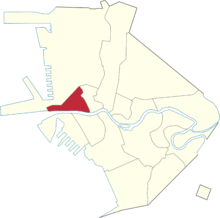San Nicolas, Manila

Map of Manila showing the location of San Nicolas.
San Nicolas is one of the sixteen districts in the city of Manila in the Philippines. It is located at the west central part of the city, on the northern bank of Pasig River bounded by the districts of Binondo to the east, and Tondo to the north and west. This community has kept its 19th-century ancestral houses, which symbolizes the wealthy lives of the people who used to live there just like the ancestral houses of Silay and Vigan.
As of the May 1, 2010 national census, the population of San Nicolas is 44,241 with 15 barangays named as numbers from 268 to 276 and from 281 to 286.[1]
| Barangay | Population (2010)[1] |
|---|---|
| Barangay 268 | 1,701 |
| Barangay 269 | 734 |
| Barangay 270 | 1,162 |
| Barangay 271 | 515 |
| Barangay 272 | 1,917 |
| Barangay 273 | 876 |
| Barangay 274 | 1,969 |
| Barangay 275 | 20,932 |
| Barangay 276 | 2,706 |
| Barangay 281 | 2,787 |
| Barangay 282 | 1,215 |
| Barangay 283 | 2,138 |
| Barangay 284 | 1,031 |
| Barangay 285 | 1,225 |
| Barangay 286 | 3,333 |
List of Cultural Properties of San Nicolas
| Cultural Property wmph identifier |
Site name | Description | Province | City/Municipality | Address/Location | Coordinates | Image |
|---|---|---|---|---|---|---|---|
| Pasig River Lighthouse | Pasig River Lighthouse | Metro Manila | San Nicolas, Manila | Muelle dela Industria Street | 14°35′47″N 120°57′39″E / 14.596401°N 120.960695°EPasig River Lighthouse) | 
| |
| General Antonio Luna Ancestral House | General Antonio Luna Ancestral House | Metro Manila | San Nicolas, Manila | #457 Urbiztondo Street | 14°35′54″N 120°58′20″E / 14.598246°N 120.972287°E |  |
Gallery
.jpg) Ancestral house
Ancestral house.jpg) Ancestral house
Ancestral house.jpg) Ancestral house
Ancestral house.jpg) Ancestral house
Ancestral house
See also
References
- 1 2 "2010 Census of the Population and Housing - National Capital Region", pg. 15. National Statistics Office. Retrieved on 2012-10-11.
This article is issued from Wikipedia - version of the 8/2/2015. The text is available under the Creative Commons Attribution/Share Alike but additional terms may apply for the media files.